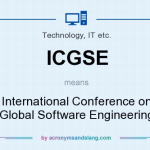How can IT offshore outsourcing vendors in countries such as India gain knowledge of their western clients such that they become able to work more effectively for the benefit of their clients?
This question lies at the heart of offshore outsourcing, but it is one that is often misunderstood.
I recently conducted a study looking at this issue from the perspective of software development engineers located offshore within Indian vendor firms.
This study is published in Information Systems Journal (Williams, 2010). I approached this issue from a knowledge-based perspective. This line of reasoning suggests there are two types of knowledge that need to be accounted for: explicit knowledge and tacit knowledge.
Explicit knowledge can be articulated and codified, and can be transferred from client to vendor in the form of documentation, training and the like. This is essentially a formal knowledge transfer. Tacit knowledge is gained through experience and an individual’s repeated interactions with others in the task environment.
In offshore outsourcing, this type of knowledge is most likely to be transferred by embedding the offshore engineers tightly within the client organization (e.g., through experience and frequent contact with the client).
In my study, I included a third element that has the potential to explain the effectiveness of knowledge transfer from client to vendor. This related to the extent to which employees in the vendor organization relied on informal discussions in the offshore location in order to share understanding of the client.
I argued that when such informal discussions about the client take place in an inappropriate way, offshore engineers may actually end up confused or unclear about client needs and organizational dynamics.
An additional aspect to the knowledge-based approach to this issue is to recognize that knowledge is not fully transferred simply by transmitting it. The knowledge must be internalized by those receiving it and then actually utilized. It is only when the new knowledge gained from a client firm is utilized by a vendor firm that we can claim the knowledge has been transferred.
My study was based on a survey of 140 software engineers located offshore in India. The respondents worked for a range of vendor companies, including the biggest names in IT offshore outsourcing. They all were assigned to software development projects for western clients. Some of the respondents in the sample had already had onshore placement experience, and some did not. I was therefore able to test the effect of onshore experience gained by the engineer.
I found formal knowledge transfer through training to have a strong impact on the perception that the engineer understands their client. This was significant both for engineers with and without onshore experience, although it was slightly stronger for those with onshore client experience.
In terms of embedding the offshore engineer with the client (measured through past experience working with the client, as well as frequency of communication with the client), I found this embedment to impact the offshore engineer’s understanding of the client only for engineers who had already had prior onshore placement with the client.
In terms of the vendor engineer’s reliance on informal discussions with offshore colleagues to understand the client, I did not find a significant impact (although coefficient signs were, as expected, negative). Interestingly, for engineers who had not had any prior onshore experience, both formal knowledge transfer and client embedment acted to reduce reliance on informal discussions amongst engineers in the offshore location.
What do these findings mean for managers in IT offshore outsourcing arrangements? Firstly, gaining an understanding of the client by individual engineers within the vendor firm is essential to allow the vendor firm to apply knowledge effectively and in the interests of the client.
Even young, newly recruited offshore engineers need to have exposure to client knowledge outside of the constraints of an IT system or project. They need to understand the wider organizational structure and dynamics of the client organization, as well as the industry pressures facing the client.
These elements of knowledge help engineers in interpreting priorities set by the client and seeing where their work fits into the bigger picture.
Secondly, client firm managers continually need to work on transforming complex knowledge within the client organization into codified forms that can be used in training vendor engineers offshore. Keeping offshore engineers up-to-date is critical, especially if the client’s own environment is changing.
Thirdly, opportunities for offshore engineers to gain an embedment with their onshore client should be pursued. This can be achieved from an offshore location over time and with frequent communications with the client. It should be clear to clients that this is in their own best interests.
In terms of onshore placements, it is unrealistic on most IT offshore outsourcing contracts for all engineers to receive this exposure. Building client embedment from an offshore location is possible and should be encouraged, especially for those with no opportunity for an actual placement onshore.
In summary, the transfer of client knowledge to individuals within a vendor firm is essential to the success of IT offshore outsourcing arrangements. The results of my study suggest that managers on both sides of the equation have to work at formal and informal modes of knowledge transfer, as well as appreciating the differences in utilizing client knowledge that arise between engineers that have had experience with the client onshore, compared to those that have not.
Reference
This article was first published by BCS, The Chartered Institute of IT.



















